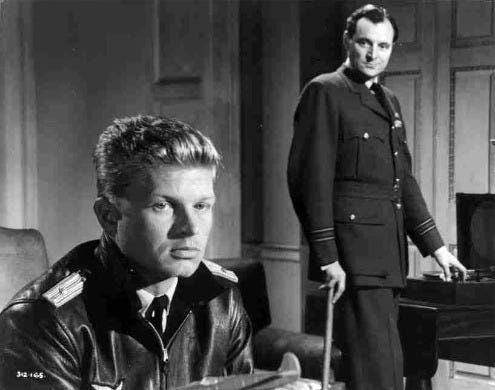The One That Got Away (1957)

The victors of every war write its history and usually the artistic renditions, too. We're used to all World War II films depicting the Allies as the good guys and the Germans (or at least Nazis) as evil warmongers, with all exploits of heroism and daring restricted to our side.
But fantastic stories and tales of bravery happen in every armed conflict and on every side. Whenever I watch a propaganda film from that era, even a good one, I always wonder why we never see the corresponding movies from Germany or Japan. Surely they were produced; were they simply destroyed by the conquerors?
I remember when "Das Boot" came out in the early 1980s, and some observers decried the fact that a mainstream movie dared to portray German submariners in favorable terms usually reserved for American G.I.s.
Lo, then, to discover a 1957 film that more or less unambiguously portrays a German P.O.W. heroically escaping from the clutches of his Allied captors — and made in England, no less! True, the British (and, later, Canadian) guards are never shown doing anything cruel or spiteful, the way numerous other films do like "The Great Escape" or "The Bridge on the River Kwai."
But there's no doubting that Franz von Werra is the hero of the film or that the audience is meant to admire and root for him.
It was the first major role by Hardy Krüger that got him noticed by American and English audiences, and for a time he was Germany's top actor. It's a typical role for Krüger, playing a character whose self-assurance borders on — and often spills over into — arrogance. Still, we identify with von Werra because of his perseverance and puckish charm.
The character is not terribly different from Steve McQueen's star-making role in "The Great Escape" — the dedicated escape artist who singlemindedly focuses on getting out of enemy clutches.
It helps that the story is based on historical fact; von Werra is still believed to be the only Axis prisoner of war who escaped and eventually made his way back to his homeland. The real von Werra became a celebrity and trained German soldiers on British interrogation techniques. It's even been suggested his story influenced Germany to start treating its own P.O.W.s better.
The film, directed by Roy Ward Baker from a screenplay by Howard Clewes, is based upon a book by James Leasor and Kendal Burt. As near as I can tell, the movie actually follows the recorded facts of von Werra's repeated escape attempts with fair accuracy and actually omits other attempts.
In all, the movie shows three escapes, steadily increasing in daring. In the first one, he simply rests on top of a stone wall during an exercise hike and, while the British guards are distracted, rolls off the top to the opposite side and runs into the woods. After a number of days in the freezing English fields, he's discovered in a mud gully.
Next, he tunnels out of prison camp along with four other Germans, armed with identity discs and disguises. Rather than attempting to run from authorities, von Werra brazenly goes straight to them, claiming to be a downed Dutch pilot trying to get back to his unit in Aberdeen. His plan is to snatch a British plane and fly back to the continent and he gets all the way into the cockpit of an experimental Hurricane before the duty officer pulls a gun on him.
Imagine if he'd been just a minute or two later and von Werra had managed to not only escape but bring a vital bit of wartime technology with him! We'd be saying his name in the same sentence as aviators like Charles Lindbergh and the Wright Brothers.
Shipped off to Canada, von Werra is stuck on a four-day train ride west, where he manages to open a frozen window and jump out of the speeding locomotive while his fellow P.O.W.s distract the Canadian guards by miming diarrhea. He then makes an iron-man crossing of the (mostly) frozen St. Lawrence River and turns himself into the American police.
Because these events happened in 1940, the U.S. was still a neutral country in the war, while Canada — as a subject nation to the British crown — was not. The film ends here, but von Werra was slipped over the Mexican border by the German consul while American and Canadian officials squabbled over his extradition.
Another interesting thing about "The One That Got Away" is that no other characters aside from the protagonist stick around for very long. Von Werra is pitted against a variety of British and Canadian military types, confounding one after the other. The only real secondary character who sticks in memory is the unnamed British interrogator (Michael Goodliffe) who has a bantering duel with von Werra near the beginning, the men coming to regard each other with an adversarial but convivial respect.
By making von Werra the only person the audience really has to hold onto, the film underlines the audience's identification with him.
4 Yaps



